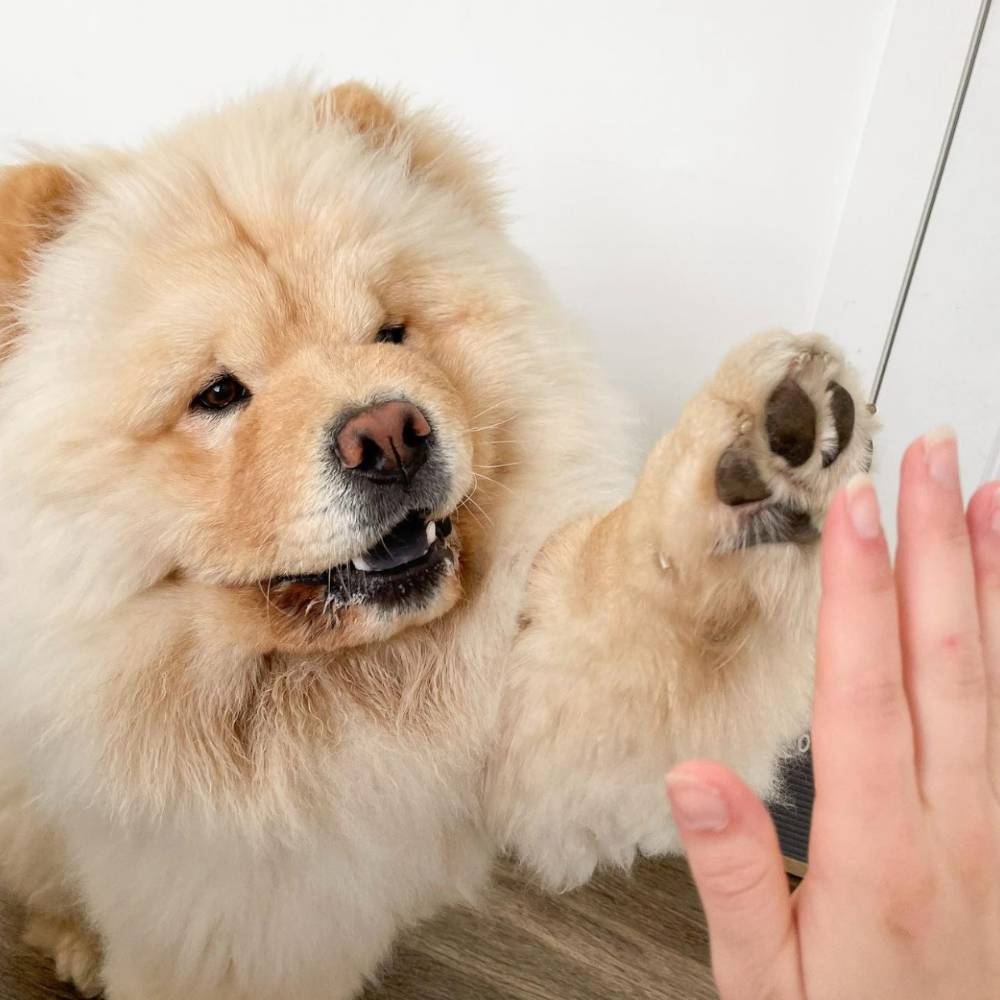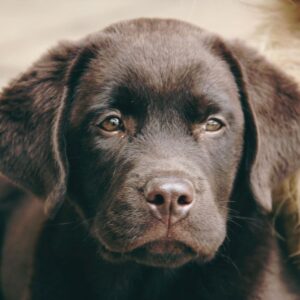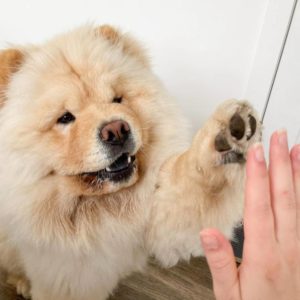Welcome to the ultimate guide on Chow Chows, the breed that has captured hearts with its lion-like mane and unique blue tongue. Whether you’re a seasoned dog owner or considering your first pet, Chow Chows are a fascinating breed with a rich history and distinct characteristics. Let’s dive into what makes them so special!
A Brief History of the Chow Chow
Chow Chows have a storied past that dates back thousands of years. Originating in China, these noble dogs were once companions to Chinese nobility and were even used for hunting and guarding. Their regal appearance and dignified demeanour make them stand out in the canine world.
Chow Chows were also known as the “Songshi Quan,” which translates to “puffy-lion dog.” They have been depicted in ancient Chinese artifacts and art dating back to the Han Dynasty (206 B.C. to 220 A.D.). Their versatility made them valuable for various roles, from hunting and herding to guarding homes and temples.
The Blue Tongue Mystery
One of the most striking features of a Chow Chow is its blue-black tongue. This unique trait sets them apart from other breeds. But why do they have blue tongues? The exact reason remains a bit of a mystery, though it’s believed to be a result of ancient genetics. Some legends say the Chow Chow was licked by the sky during creation, while others believe it’s linked to their ancestors’ diet and habitat.
In scientific terms, the blue-black coloration is due to the presence of pigmented cells called melanin. Interestingly, only a few other animals, such as the giraffe and some cattle breeds, share this trait. This pigmentation likely evolved as a genetic anomaly and became a defining characteristic of the breed.
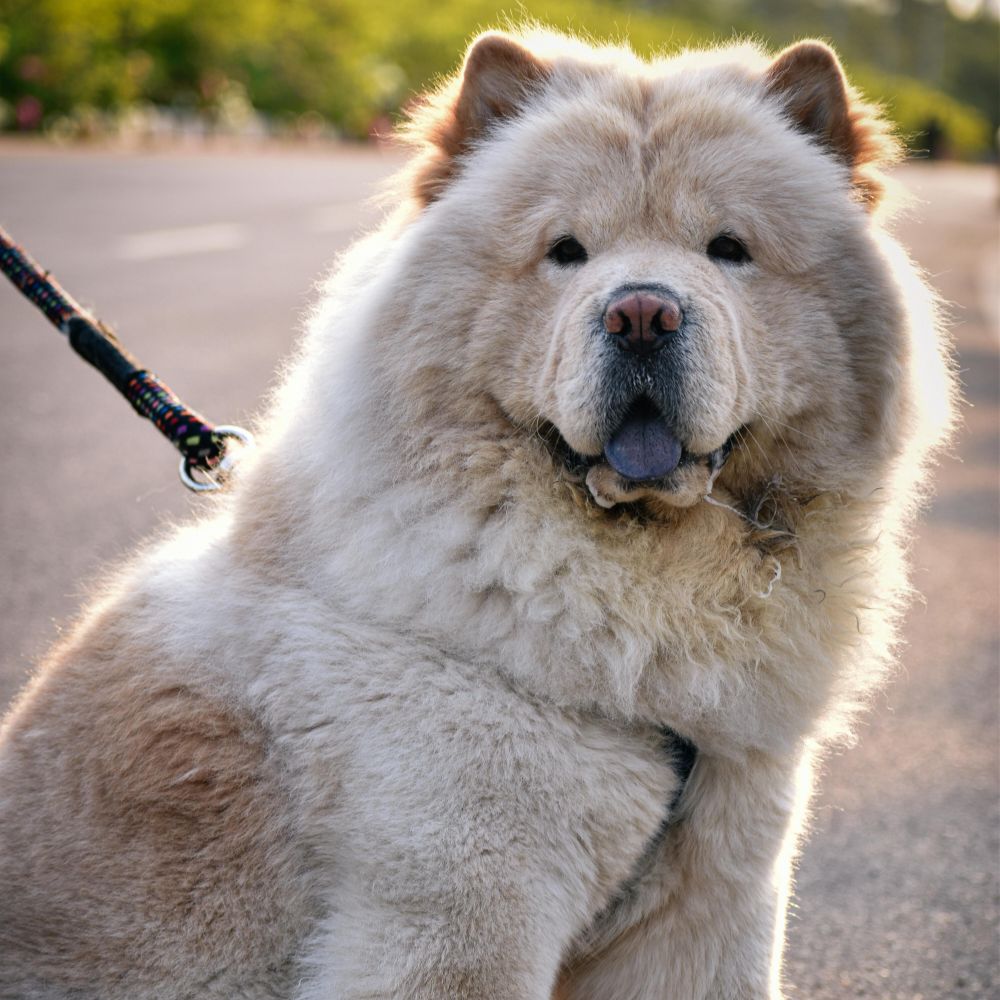

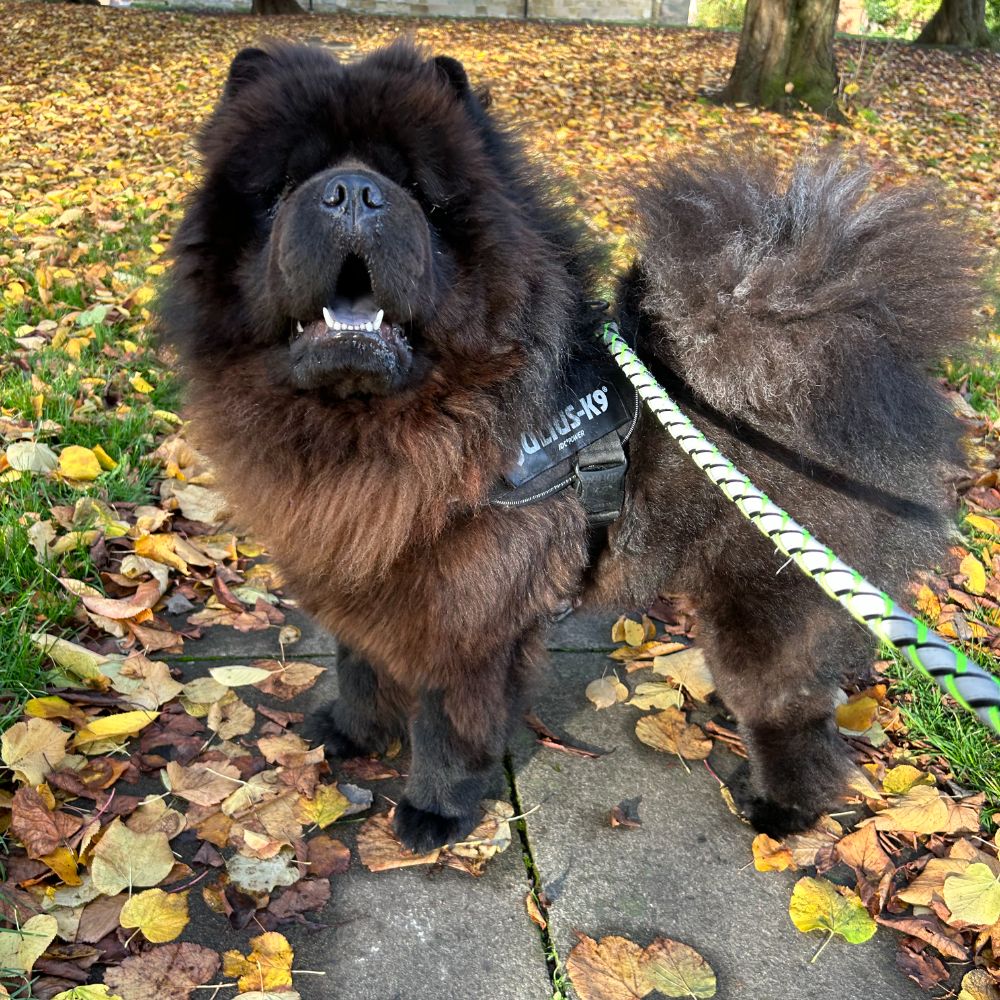
Appearance and Temperament
Chow Chows are known for their lion-like coat and scowling expression, which give them an air of aloofness. But don’t be fooled by their serious looks—Chow Chows are loyal and devoted companions. They’re independent, often reserved with strangers, but incredibly loving with their family.
Appearance
Coat: Thick double coat, either rough or smooth.
Colours: Red, black, blue, cinnamon, and cream.
Size: Medium, weighing between 45-70 pounds.
Height: 17-20 inches at the shoulder.
Build: Sturdy and compact with a strong, square body.
Temperament
Loyalty:
Friendliness:
Trainability:
Guarding Instinct:
Chow Chows are known for their cat-like independence. They are dignified and can be quite stubborn, which makes training a unique challenge. Despite their aloofness, they form strong bonds with their family and can be very protective.
Lifespan and Health
A healthy Chow Chow typically lives between 9 to 15 years. Like all breeds, they have their own set of health considerations, including hip dysplasia and eye issues. Regular vet check-ups and a balanced diet are key to ensuring your Chow Chow lives a long and healthy life.
Health Considerations
Hip Dysplasia:
Eye Issues:
Overall Health:
Chow Chows are also prone to other health issues such as entropion (a condition where the eyelid rolls inward), allergies, and thyroid problems. Keeping up with regular veterinary care and monitoring for any signs of discomfort or unusual behaviour can help manage these conditions effectively.
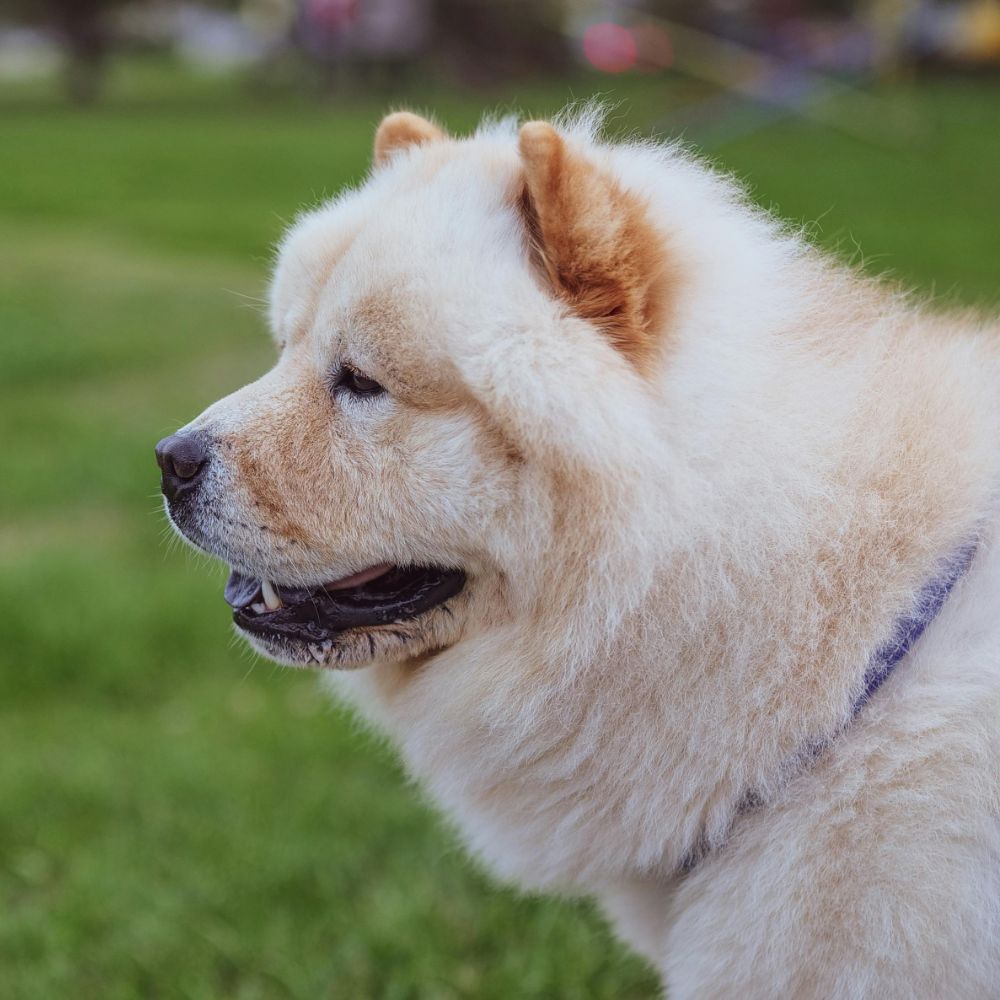
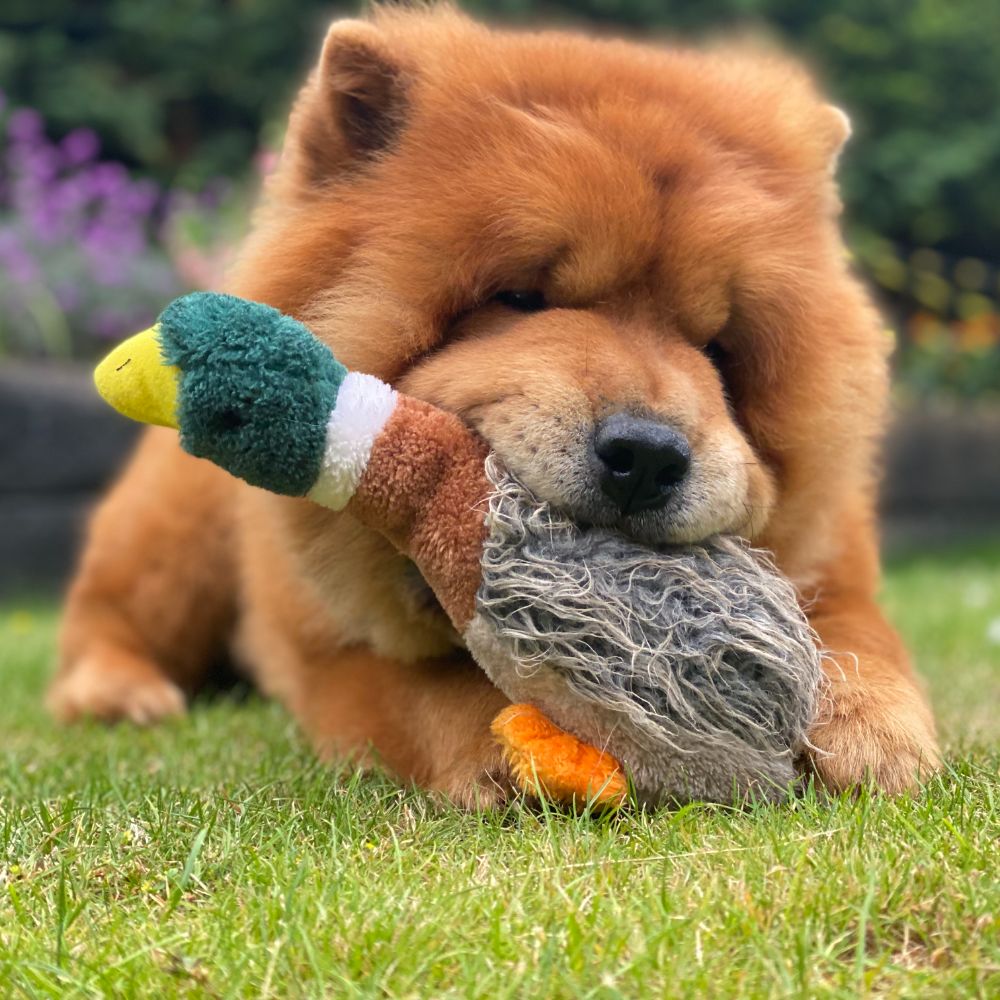
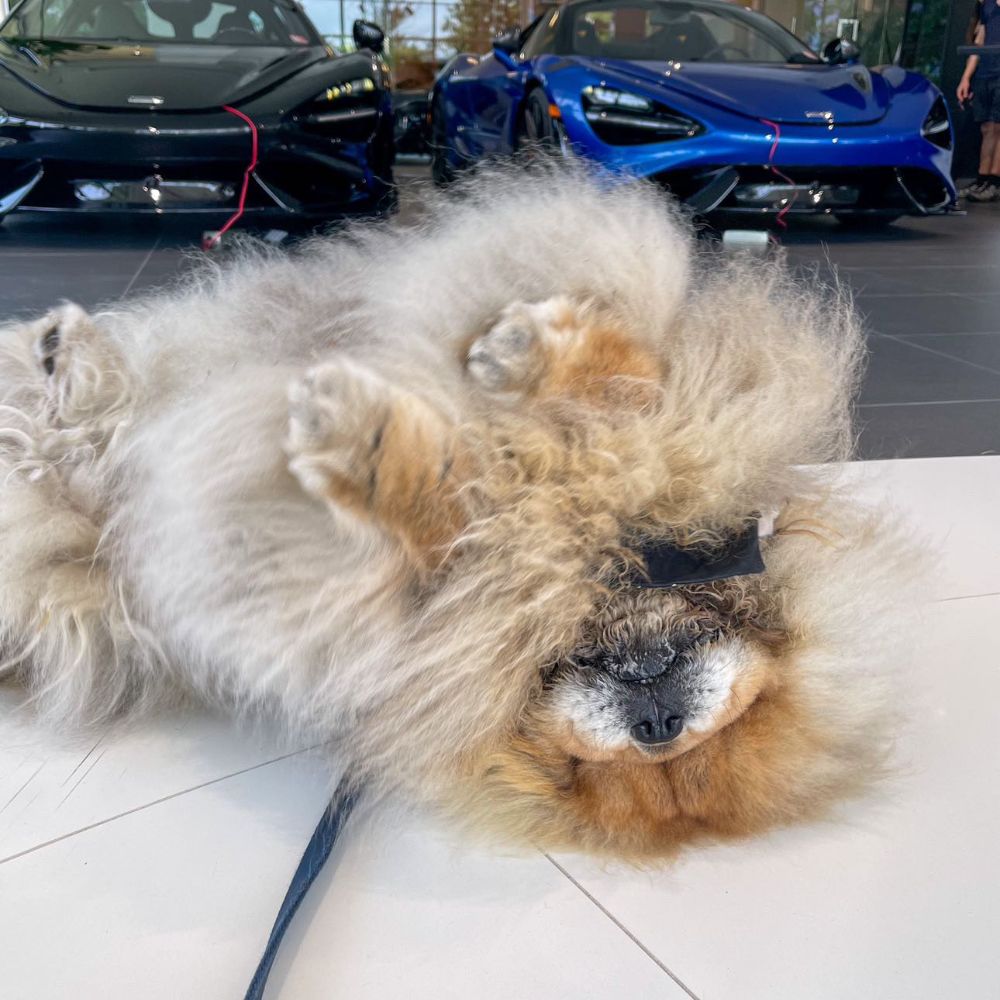
Caring for Your Chow Chow
Grooming is an essential part of Chow Chow care. Their thick double coat requires regular brushing to prevent matting and reduce shedding. Chow Chows can be quite stubborn, so early training and socialisation are crucial to raise a well-behaved adult dog.
Grooming Needs
Brushing Frequency: Daily
Shedding: Seasonal heavy shedding
Bathing: Monthly or as needed
Professional Grooming: Regular professional grooming is recommended to keep their coat in optimal condition.
Due to their dense fur, Chow Chows are more susceptible to heatstroke. It’s important to keep them cool in hot weather and avoid excessive exercise during peak temperatures. Regular grooming also helps in spotting any skin issues early on.
Constant grooming is vital to manage their heavy shedding periods, especially during spring and Autumn when they shed their undercoat. Invest in high-quality grooming tools such as slicker brushes, combs, and de-shedding tools to keep their coat healthy and free of mats.
Training Tips
Start Early: Begin training and socialisation from a young age.
Consistency is Key: Use consistent commands and positive reinforcement.
Patience Required: Be patient, as Chow Chows can be independent and stubborn.
Positive reinforcement methods work best with Chow Chows. Use treats, praise, and play to motivate them. Socialising them early helps in managing their natural wariness of strangers and reduces the likelihood of aggressive behaviour.
Chow Chows and Other Pets
Chow Chow Friendliness with Cats
Chow Chows have a mixed reputation when it comes to living with cats. While some Chow Chows can coexist peacefully with feline companions, others may display a strong prey drive or territorial behaviour.
Compatibility:
Early Socialisation: Introduce them to cats at a young age to foster better relationships.
Supervision: Always supervise interactions between Chow Chows and cats until you are confident in their behaviour.
Chow Chows and Children
Chow Chows can be good family dogs, but their interaction with children requires supervision and understanding from both parties.
Friendliness with Children:
Best with Older Children: Chow Chows are typically better suited for families with older children who understand how to respect a dog’s space and boundaries.
Supervised Play: Always supervise playtime between Chow Chows and children to prevent any accidental harm.
Chow Chows with Other Chow Chows
Having multiple Chow Chows can be a rewarding experience, but it requires careful management and understanding of their unique social dynamics.
Compatibility with Other Chow Chows:
Early Introduction: Introducing Chow Chows to each other at a young age can foster better relationships.
Same-Sex Aggression: Be cautious with same-sex pairs, as Chow Chows can exhibit territorial behaviour, especially between males.
Supervised Interactions: Always supervise initial interactions and be ready to intervene if necessary.
Chow Chows tend to be more accepting of other Chow Chows if they are raised together from a young age. However, even adult Chow Chows can learn to coexist peacefully with proper introductions and consistent management.
Other Dogs’ Reactions to Chow Chows
The unique build and tail of Chow Chows can sometimes provoke interesting reactions from other dogs.
Appearance Impact: Chow Chows’ lion-like mane and curled tail can be intimidating to other dogs who might misinterpret their body language.
Tail Position: The tail, which curls over the back, can sometimes be seen as a sign of dominance, potentially causing confrontational reactions.
Socialisation: Early socialization with various dog breeds can help mitigate negative reactions from other dogs.
Calm Introduction: Introduce Chow Chows to new dogs in a calm and controlled manner to reduce misunderstandings and ensure positive interactions.
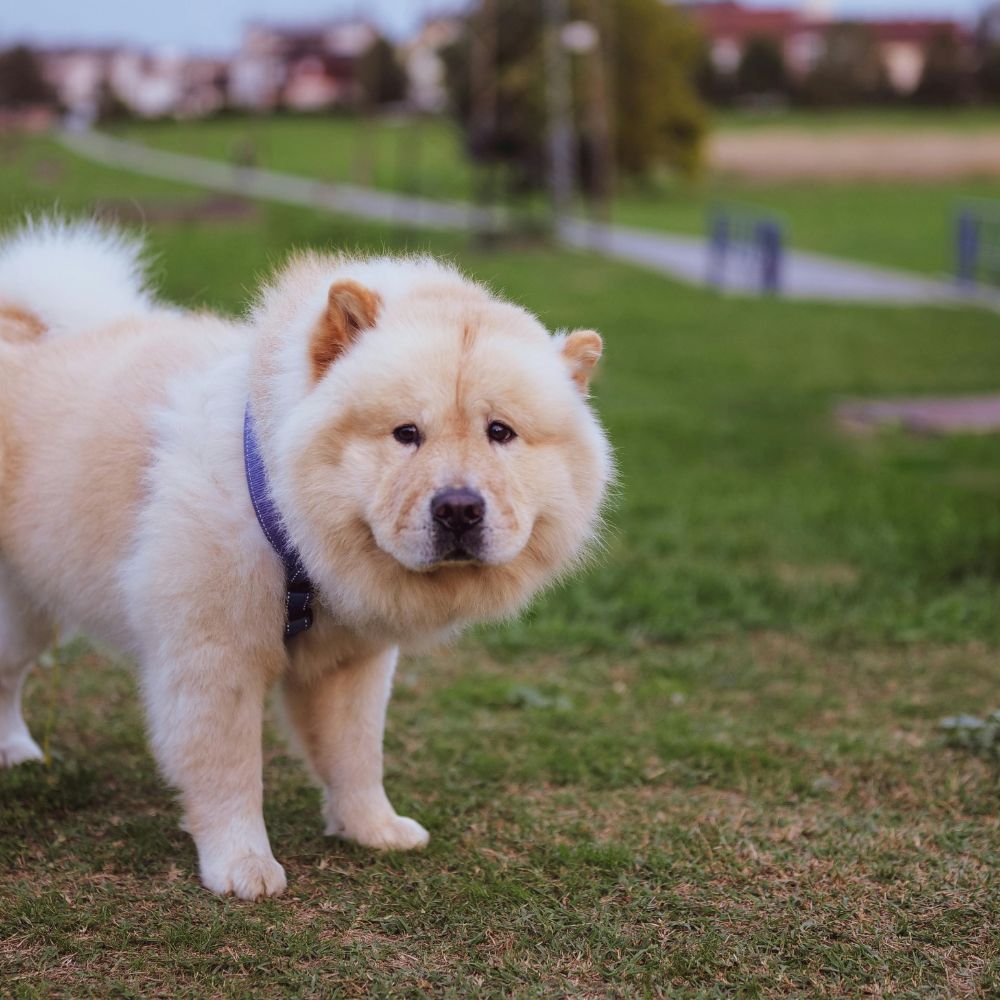
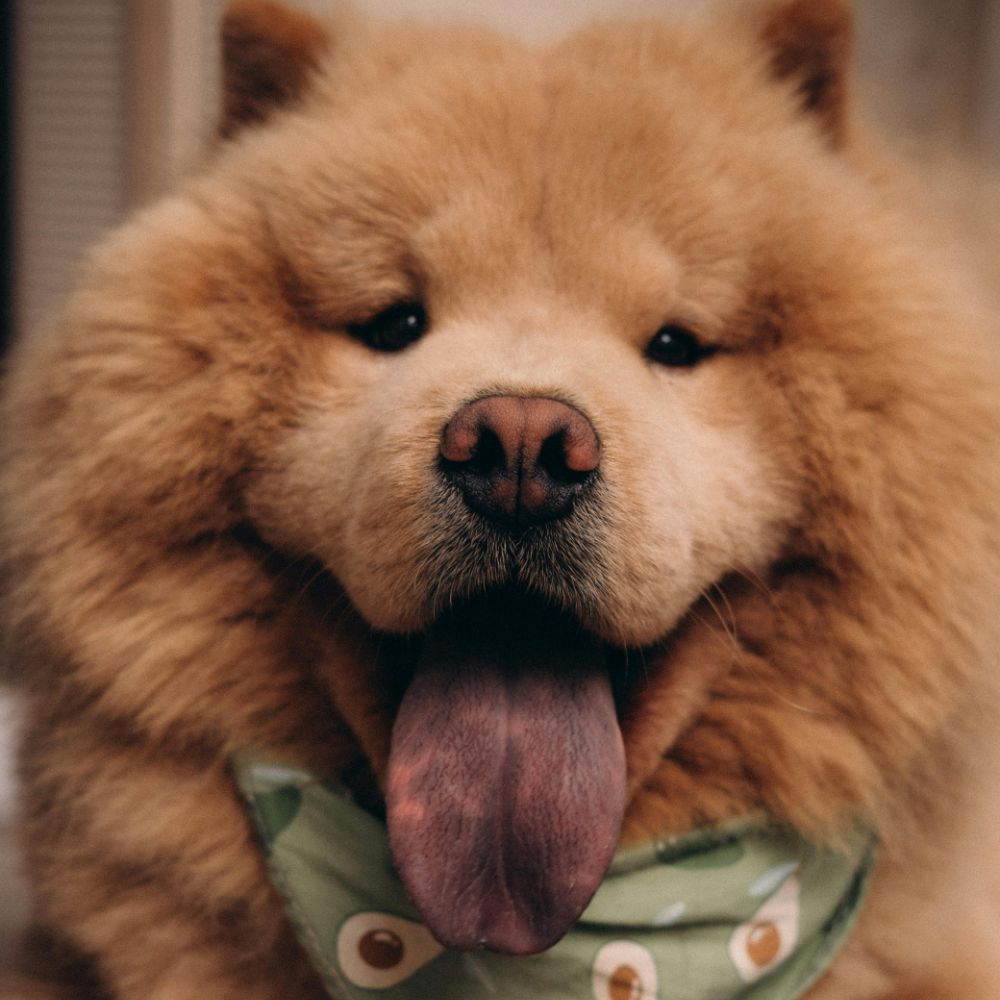
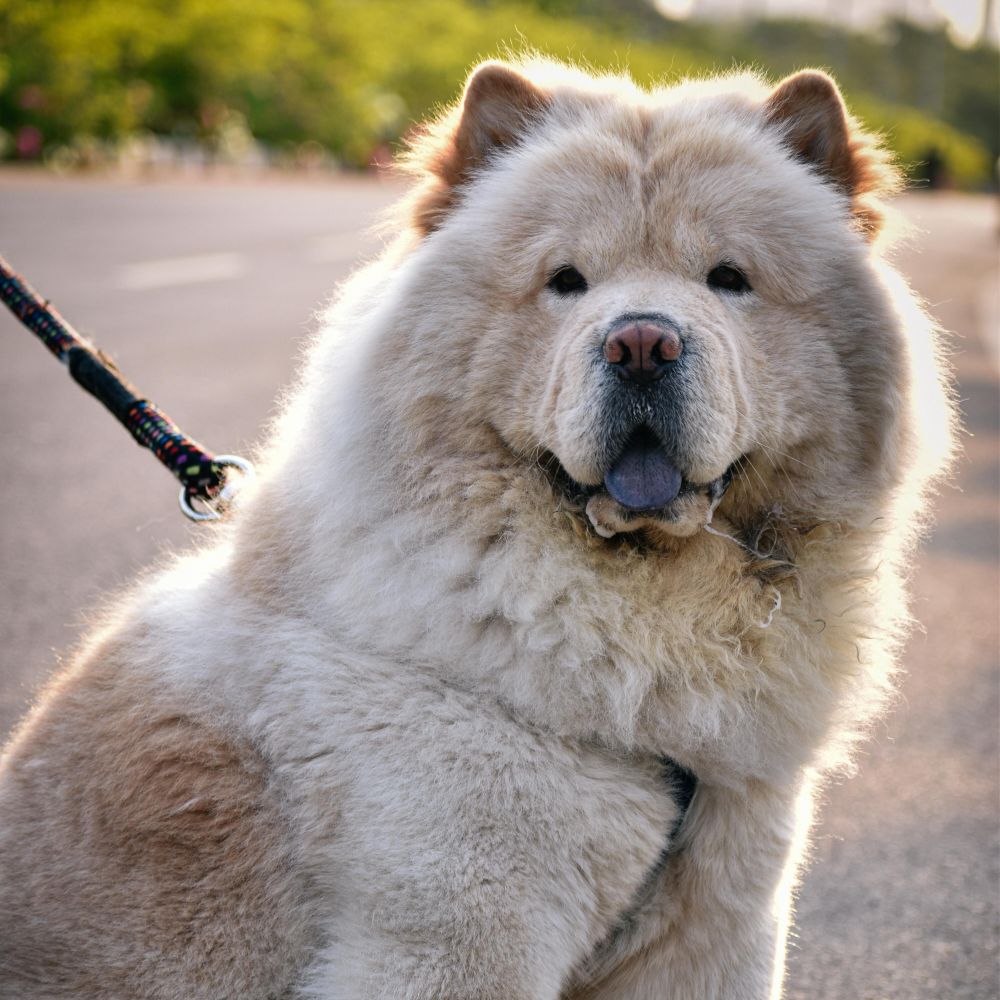
Cost of Pet Insurance for Chow Chows
Owning a Chow Chow comes with financial considerations, including the cost of pet insurance. Given their predisposition to certain health issues, investing in pet insurance can be a wise decision.
Average Monthly Cost: $60-$150 (£45-£110), depending on the level of coverage and the provider.
Factors Affecting Cost: Age, health history, location, and chosen coverage plan.
Recommended Coverage: Look for plans that cover hereditary conditions, hip dysplasia, and regular wellness checks.
Veterinary Costs for Chow Chows
Regular veterinary care is crucial to maintaining the health and well-being of your Chow Chow. Here are some estimated costs you might incur:
Annual Check-ups: $200-$300 (£150-£230)
Vaccinations: $75-$150 (£55-£110) per year
Flea/Tick Prevention: $50-$100 (£40-£75) per year
Spaying/Neutering: $200-$500 (£150-£375)
Emergency Visits: $200-$1,000 (£150-£750) depending on the severity of the issue
Specialist Visits: Costs can vary widely, often ranging from $100-$300 (£75-£230) per visit
Buying a Chow Chow: What You Need to Know
Purchasing a Chow Chow is a significant decision that requires careful consideration to ensure you are buying from a reputable source.
Choosing the Right Breeder
Research Thoroughly: Look for breeders with a solid reputation and positive reviews from previous buyers.
Visit the Breeder: Arrange a visit to see the breeding facilities and meet the puppies and their parents. A reputable breeder will welcome your visit.
Health Screenings: Ensure the breeder provides health screenings and certifications for the puppies and their parents. This includes screenings for common issues like hip dysplasia and eye problems.
Ask Questions: A good breeder will be knowledgeable about the breed and happy to answer your questions about health, temperament, and care.
Red Flags to Avoid
Puppy Mills: Avoid purchasing from puppy mills, which often prioritize profit over the well-being of the dogs. Signs of a puppy mill include poor living conditions, multiple breeds for sale, and lack of transparency.
Pet Stores: Many pet stores source their puppies from puppy mills. It’s best to avoid buying a Chow Chow from a pet store.
Online Scams: Be cautious of online ads offering Chow Chows at unusually low prices. Always verify the legitimacy of the seller before making any payments.
Public Stereotypes of Chow Chows
Chow Chows are often subject to various stereotypes, some of which are based on their distinct appearance and aloof demeanour. Understanding these stereotypes can help in managing expectations and educating others about the breed.
Common Stereotypes
Aggressive Nature: Some people perceive Chow Chows as inherently aggressive due to their guarding instincts and reserved nature. While they can be protective, proper training and socialisation can mitigate aggressive tendencies.
Aloofness: Chow Chows are often seen as aloof and uninterested in human interaction. While they are independent and reserved, they form strong bonds with their family and can be very affectionate.
Difficult to Train: Their stubbornness can lead to a stereotype that they are untrainable. However, with consistent and positive training methods, Chow Chows can be well-behaved and obedient.
High Maintenance: Due to their grooming needs, some people believe Chow Chows are too high maintenance. While they do require regular grooming, it becomes manageable with routine care and professional help.
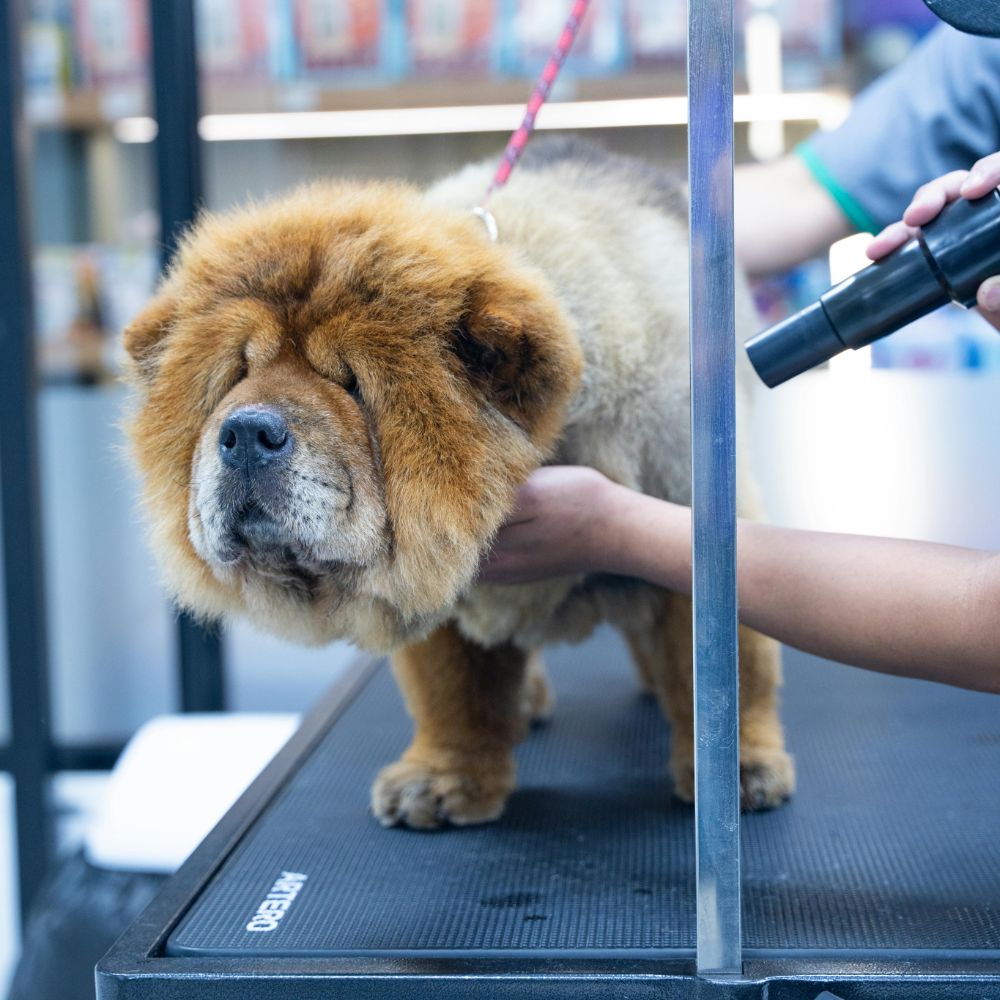
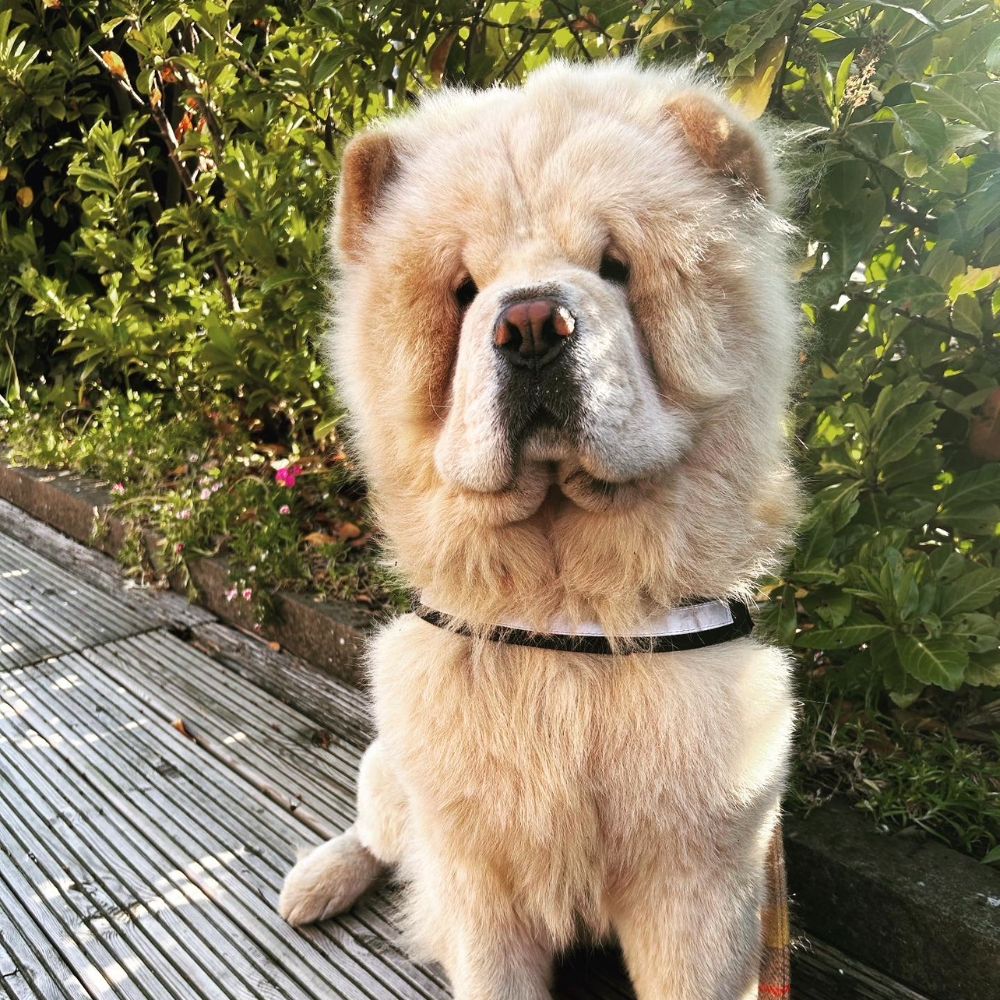
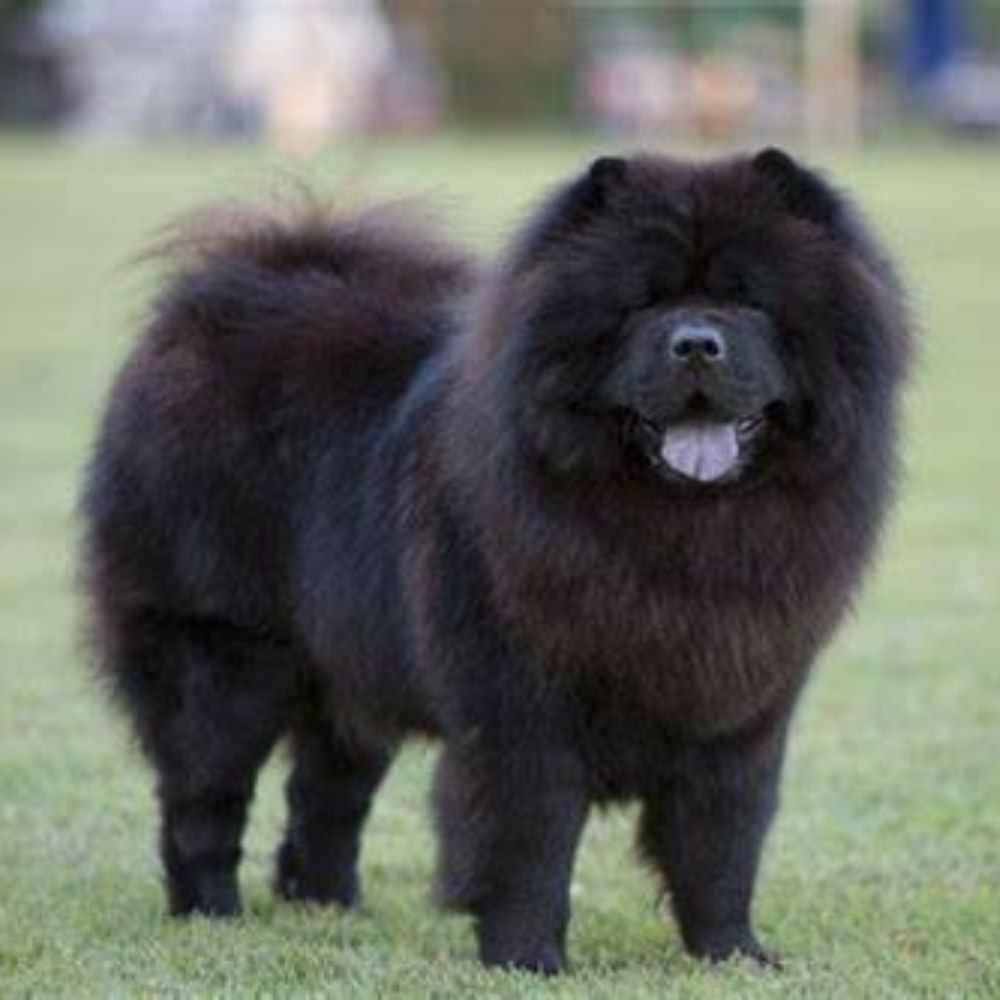
Addressing Stereotypes
Education: Educate others about the true nature of Chow Chows. Share information about their history, temperament, and care requirements.
Demonstration: Show through example how well-behaved and loving a properly trained and cared-for Chow Chow can be.
Positive Interaction: Encourage positive interactions between Chow Chows and the public to dispel myths and build a better understanding of the breed.
Pros and Cons of Owning a Chow Chow
Pros
Unique Appearance: Their lion-like mane and blue tongue make them stand out.
Loyal Companions: Devoted to their families and make excellent guard dogs.
Rich History: A breed with a fascinating historical background.
Independent Nature: They are self-sufficient and dignified.
Protective Instincts: Natural guardians of their homes and loved ones.
Cons
Grooming Requirements: Their thick coat requires regular grooming and maintenance.
Heat Sensitivity: Susceptible to heatstroke due to their dense fur.
Stubbornness: Can be difficult to train and require a patient, experienced owner.
Health Issues: Prone to specific health conditions that can be costly to manage.
Aloofness: May be reserved and less affectionate compared to other breeds.
High Vet Costs: Regular vet visits and potential specialist care can be expensive.
Is a Chow Chow Right for You?
Chow Chows are best suited for experienced dog owners who understand their unique needs. They thrive in a calm environment and appreciate routine. If you’re ready to commit to regular grooming, training, and plenty of love, a Chow Chow could be the perfect addition to your family.
Suitability Ratings
First-time Owners:
Experienced Owners:
Families with Children:
Apartment Living:
Chow Chows can adapt to apartment living, provided they get enough exercise. However, their reserved nature and guarding instincts mean they may not be the best choice for families with very young children. Older children who understand how to interact respectfully with dogs will get along better with a Chow Chow.
Top Features of Chow Chows
Unique Appearance: Their lion-like mane and blue tongue make them stand out.
Loyal Companions: Devoted to their families and make excellent guard dogs.
Rich History: A breed with a fascinating historical background.
Independent Nature: They are self-sufficient and dignified.
Protective Instincts: Natural guardians of their homes and loved ones.
Frequently Asked Questions (FAQ)
Do Chow Chows bark a lot?
Chow Chows are generally not excessive barkers. They tend to bark when necessary, such as to alert their owners of strangers or unusual activities.
Are Chow Chows hypoallergenic?
No, Chow Chows are not hypoallergenic. They have a thick double coat and shed, which can trigger allergies in sensitive individuals.
Can Chow Chows live in hot climates?
Chow Chows can live in hot climates, but special care must be taken to keep them cool. Provide plenty of shade, water, and avoid strenuous activities during peak heat.
How intelligent are Chow Chows?
Chow Chows are quite intelligent but can be independent and stubborn. They require consistent training and positive reinforcement to learn effectively.
Do Chow Chows need a lot of exercise?
Chow Chows require moderate exercise, including daily walks and playtime. They are not as high-energy as some breeds but still need regular activity to stay healthy.
How do you socialise a Chow Chow?
Early and consistent socialisation is key. Expose your Chow Chow to different people, environments, and other animals from a young age to foster a well-rounded temperament.
Are Chow Chows prone to separation anxiety?
Chow Chows are typically more independent and less prone to separation anxiety compared to some other breeds. However, they still need attention and companionship.
What type of coat does a Chow Chow have?
Chow Chows have a thick double coat that can be either rough or smooth. The rough coat is longer and more abundant, while the smooth coat is shorter and denser.
How often should I bathe my Chow Chow?
Bathe your Chow Chow monthly or as needed. Over-bathing can strip the coat of natural oils, so it’s important to balance cleanliness with coat health.
Are Chow Chows good for first-time dog owners?
Chow Chows are better suited for experienced dog owners due to their independent nature and grooming needs. First-time owners may find them challenging without proper preparation and research.
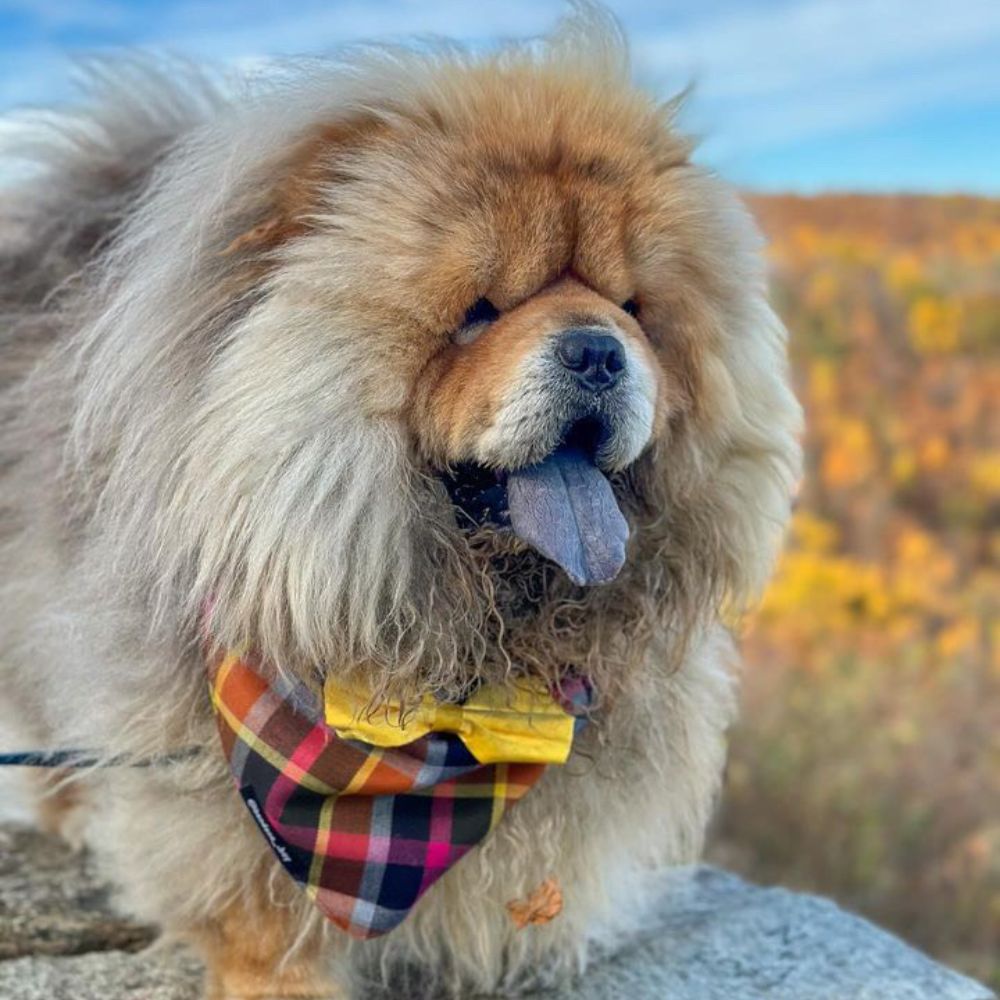
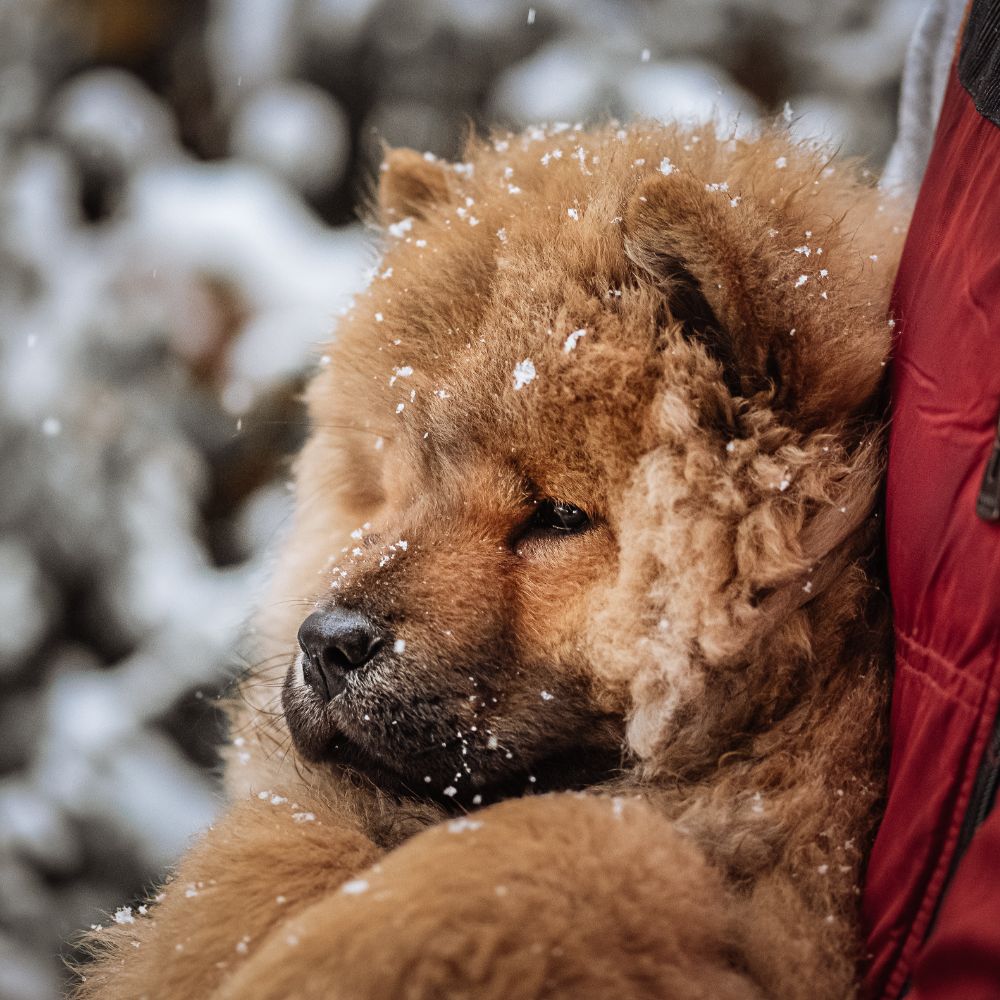

Recommended Chow Chow Veterinarians
United Kingdom
Kyumi McDonald – Medivet Hemel Hempstead, UK
Kyumi is known by various Chow Chow owners for being knowledgeable and experienced in treating Chow Chows and their typical issues. Her special knowledge of Chow Chows makes her stand out as a top recommendation.
The Queen’s Veterinary School Hospital – University of Cambridge, UK
The Queen’s Veterinary School Hospital is part of the University of Cambridge and offers advanced care for various breeds, including Chow Chows. They have specialists in dermatology, ophthalmology, and orthopaedics, which are essential for managing the common health issues of Chow Chows.
The Queen’s Veterinary School Hospital.
Fitzpatrick Referrals – Surrey, UK
Known for its pioneering work in veterinary medicine, Fitzpatrick Referrals offers specialist care for orthopaedic and neurological conditions, making it an excellent choice for Chow Chows prone to hip dysplasia and other joint issues.
The Ralph – Marlow, UK
The Ralph is renowned for its comprehensive and compassionate care. With state-of-the-art facilities and a team of specialists, they are well-equipped to handle the unique health needs of Chow Chows, including skin conditions, joint issues, and routine check-ups.
The Ralph Veterinary Referral Centre.
United States
The Animal Medical Centre – New York, USA
A leading veterinary hospital offering a wide range of services from general care to specialized treatments, making it a top choice for Chow Chow owners.
VCA West Los Angeles Animal Hospital – California, USA
Known for its comprehensive care and advanced diagnostic services, this hospital provides top-notch medical care for Chow Chows, addressing all their specific health needs.
VCA West Los Angeles Animal Hospital.
Angell Animal Medical Centre – Massachusetts, USA
Offering specialised care and emergency services, Angell Animal Medical Centre is a trusted name for Chow Chow owners looking for expert veterinary care.
Finding a Chow Chow-Friendly Veterinarian
Finding a veterinarian who is experienced with Chow Chows is crucial due to the breed’s unique characteristics and potential health issues. Here are some tips:
Community Recommendations:
Engage with Chow Chow communities and forums, such as the Facebook group Chow Chow Community | The Home of Chow Chows, where you can get recommendations from other Chow Chow owners.
Veterinary Associations:
Look for veterinarians who are members of professional associations such as the American Veterinary Medical Association (AVMA) or similar organizations in your country.
Breeder Recommendations:
Ask reputable breeders for their recommended veterinarians. Breeders often have established relationships with vets who are familiar with the breed.
Rescuing a Chow Chow: What You Need to Know
Adopting a rescue dog can be a rewarding experience, and rescuing a Chow Chow is no exception. This breed, known for its dignified demeanour and unique appearance, often finds itself in need of new homes due to various reasons. Here’s what you need to know about rescuing a Chow Chow and where to find them.
Reputable Rescue Organisations
Here are some organizations and individuals known for their work with Chow Chow rescues:
United Kingdom
Fenella Reid is well-known for her dedication to rescuing and rehabilitating Chow Chows in Norfolk. She has a deep understanding of the breed and provides excellent care for the dogs in her rescue.
Dogs Trust Chow Chow Rescue UK
This organisation focuses on rescuing and rehoming Chow Chows and other dogs across the UK. They work tirelessly to find the right match for their dogs.
United States
Chow Chow Rescue of Central New York
Dedicated to rescuing Chow Chows in need, this organization provides medical care, rehabilitation, and rehoming services. They have a network of foster homes to help dogs transition smoothly.
Serving the western United States, this rescue focuses on saving Chow Chows from high-kill shelters and neglectful situations. They work to rehabilitate and rehome these dogs with loving families.
Final Thoughts
Chow Chows are more than just their unique appearance. Their rich history, loyal nature, and intriguing characteristics make them a breed worth owning. Whether you’re a Chow Chow enthusiast or just curious, there’s always more to discover about these magnificent dogs.
Chow Chows offer a blend of beauty, loyalty, and history that few other breeds can match. If you’re looking for a dog that is as independent as it is devoted, the Chow Chow might just be the perfect companion for you.
With the right care, training, and love, a Chow Chow can be a rewarding addition to your life, offering years of companionship and unique experiences. Remember, owning a Chow Chow is a commitment, but for those who are up to the task, it’s a journey filled with joy and unforgettable moments.
